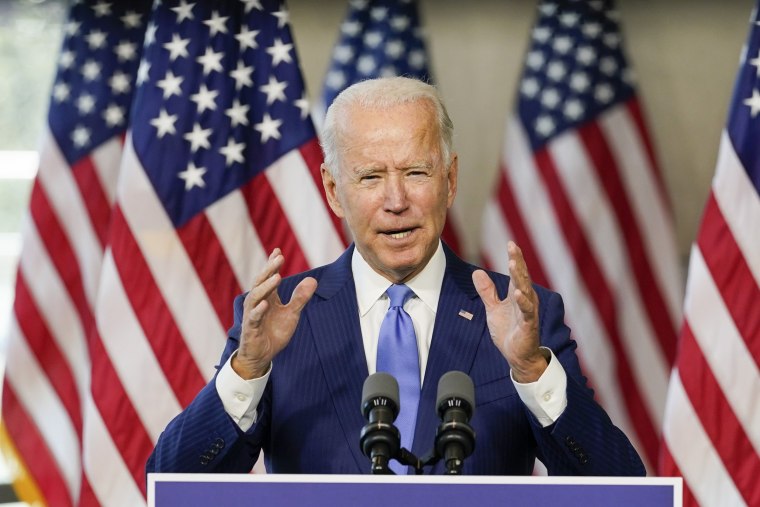Joe Biden made an explicit plea to Senate Republicans on Sunday not to vote on President Donald Trump's coming Supreme Court nominee ahead of the November election.
In a speech at the National Constitution Center in Philadelphia, Biden, the Democratic presidential nominee, accused Trump and Senate Majority Leader Mitch McConnell, R-Ky., of trying to engage in "constitutional abuse" following Justice Ruth Bader Ginsburg's death Friday.
"To jam this nomination through the Senate is just an exercise in raw political power," Biden said. "I don't believe the people of this nation will stand for it."
Noting that voters have already begun casting ballots in some states, Biden said, "Their voice should be heard."
"I believe voters are going to make it clear they will not stand for this abuse of power," he said. "Constitutional abuse."
Biden said that should Trump submit a nominee, the Senate should not act until the election is resolved.
"If Donald Trump wins the election — then the Senate should move on his selection and weigh that nominee fairly," Biden said. "But if I win the election, President Trump's nomination should be withdrawn."
He called on Senate Republicans to help "de-escalate" tensions and to follow their "conscience," saying they should "cool the flames that have been engulfing our country."
"I'm speaking to those Republicans out there, Senate Republicans, who know deep down what is right for the country and consistent with the Constitution," he said. "Not just what's best for their party."
While Biden said he would not release a list of potential nominees he would put forward, he again hinted that his nominee would be a Black woman. He said, however, that by releasing a list of potential picks, he could give the appearance of improperly influencing their decision-making while exposing them to political attacks.
Biden said he would make his Supreme Court choice "based on what prior presidents have done," and he pledged to consult with both Democratic and Republican senators.
Biden spoke after Trump pledged to fill Ginsburg's seat quickly with a female nominee. An early front-runner is Amy Coney Barrett, 48, a judge on the 7th U.S. Circuit Court of Appeals who was also on Trump's list to replace Justice Anthony Kennedy in 2018.
McConnell, meanwhile, has pledged a swift confirmation process amid criticism from Biden and other leading Democrats that he is being hypocritical in light of his 2016 thwarting of President Barack Obama's Supreme Court pick Merrick Garland, a federal appeals judge. McConnell refused to hold any hearings related to Garland's nomination, saying months ahead of that year's election that the voters should have a voice in the selection.
McConnell and other Republicans defended the change of tone, pointing to Republican control of both the White House and the Senate — one-party control was not the case in 2016.
"In the last midterm election before Justice Scalia's death in 2016, Americans elected a Republican Senate majority because we pledged to check and balance the last days of a lame-duck president's second term," he said in a statement. "We kept our promise. Since the 1880s, no Senate has confirmed an opposite-party president's Supreme Court nominee in a presidential election year."
Trump campaign communications director Tim Murtaugh echoed McConnell in a statement Sunday.
"Voters elected Donald J. Trump president in 2016 and gave Republicans an expanded majority in 2018, so the people already have spoken," he said. "The president has placed two well-qualified justices on the court so far and he is about to select a third."
Download the NBC News app for breaking news and politics
With just over a month until the election, Democrats are scrambling to figure out how they can prevent the president from filling the seat before Nov. 3. With Republicans holding a 53-47 majority in the Senate, four Republicans would need to voice opposition to thwart a pre-election confirmation, so long as no Democrat breaks ranks.
Two Republican senators, Lisa Murkowski of Alaska and Susan Collins of Maine, have already come out against voting on a nominee before the election. But Republicans could still confirm a pick during a lame-duck session of Congress should Biden win.
House Speaker Nancy Pelosi, D-Calif., on Sunday would not rule out impeaching Trump or Attorney General William Barr if the Senate seeks to push through such a nomination during a lame-duck session. And in a call with Democratic senators Saturday, Minority Leader Chuck Schumer of New York suggested an openness to expanding the court if Trump's pick is seated on the bench and Democrats retake the White House and the Senate.
While judicial activism has moved Republican voters to the polls for years, recent polling shows that the judiciary is an issue that is galvanizing Democrats this year.
On Sunday, a Reuters/Ipsos poll found that 62 percent of American adults believe the vacancy should be filled by the winner of the fall election, while 23 percent disagreed. Split into party affiliations, 9 of 10 Democrats and 5 of 10 Republicans agreed with the statement.
CORRECTION (Sept. 21, 2020, 7:45 a.m. ET): An earlier version of this article misstated Trump’s public comments about his plans for the nomination. He has said he plans to nominate a woman to the court, not a Black woman.

